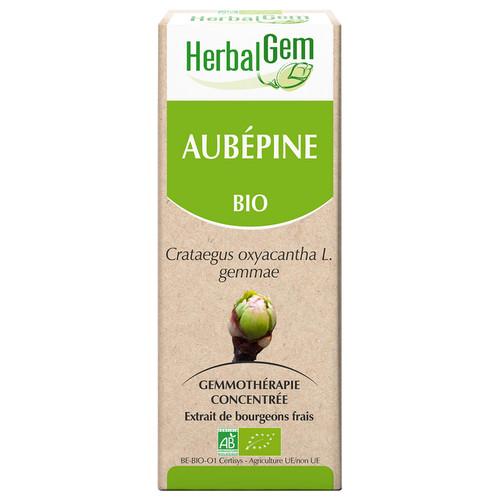Hawthorn, also known by its scientific name Crataegus, is a plant widely used in phytotherapy for its many medicinal virtues. Native to the temperate regions of Europe, Asia and North America, this plant is distinguished by its delicate white flowers and red berries.
Known for centuries, hawthorn is particularly prized for its effectiveness in supporting cardiovascular health. It is used to treat hypertension, palpitations and heart rhythm disorders. In addition, its calming properties make it a valuable ally against stress and anxiety. Thanks to its diverse benefits, hawthorn occupies a place of choice in natural remedies, and continues to seduce phytotherapy enthusiasts around the world.
What is hawthorn?
Hawthorn, or Crataegus, is a shrub in the Rosaceae family, known for its small white flowers and red berries. It generally grows in hedges, open woods and forest edges. Native to the temperate regions of Europe, Asia and North America, hawthorn is now widely distributed throughout the world.
Hawthorn has been used in traditional medicine since ancient times. The Greeks and Romans used it for its soothing and cardioprotective properties.
Even in the Middle Ages, hawthorn was reputed to treat heart and circulatory disorders. Thanks to its virtues, hawthorn continues to be a leading plant in phytotherapy, particularly appreciated for its beneficial effects on the cardiovascular and nervous systems.
What are hawthorn's active compounds?
or Crataegus, is rich in active compounds that give it its many benefits in phytotherapy. Its main components include flavonoids, proanthocyanidins and triterpene acids.
Les flavonoïdes, tels que la quercétine et l'hyperoside, sont connus pour leurs propriétés antioxydantes. Ils protègent les cellules contre les dommages oxydatifs et renforcent les parois des vaisseaux sanguins, favorisant ainsi une meilleure circulation sanguine.
Les proanthocyanidines, quant à elles, sont des polyphénols qui soutiennent la santé cardiovasculaire en améliorant la dilatation des artères et en réduisant la pression artérielle. Enfin, les acides triterpéniques, comme l'acide ursolique, possèdent des effets anti-inflammatoires et cardioprotecteurs.
These active compounds play a crucial role in hawthorn's therapeutic benefits. They act synergistically to provide calming and protective effects on the cardiovascular and nervous systems. Thanks to these properties, hawthorn is an essential plant in phytotherapy for the natural treatment of various health disorders.
The cardiovascular benefits of hawthorn
L'aubépine est particulièrement reconnue pour ses bienfaits sur le système cardiovasculaire. Elle joue un rôle crucial dans la régulation de la pression artérielle.
En effet, les flavonoïdes présents dans l'aubépine, tels que la quercétine et l'hyperoside, aident à dilater les vaisseaux sanguins, facilitant ainsi le flux sanguin et réduisant la résistance vasculaire. Cette action vasodilatatrice contribue à abaisser la pression artérielle, offrant un soutien naturel aux personnes souffrant d'hypertension.
improves blood circulation. Proanthocyanidins, another group of active hawthorn compounds, strengthen blood vessel walls and increase their elasticity.
This improved vascular health means better distribution of oxygen and nutrients throughout the body, reducing the risk of cardiovascular disease.
Hawthorn is also beneficial for strengthening the heart muscle. Its triterpene acids, such as ursolic acid, have anti-inflammatory and cardioprotective properties.
Ces composés aident à protéger le cœur contre les dommages et à améliorer sa fonction globale.
En renforçant le muscle cardiaque, l'aubépine peut contribuer à prévenir les palpitations et à réguler le rythme cardiaque, offrant ainsi un soutien précieux aux personnes atteintes de troubles cardiaques.

De nombreuses études cliniques et preuves scientifiques soutiennent ces bienfaits. Par exemple, une étude publiée dans le Journal of the American College of Cardiology a révélé que l'extrait d'aubépine améliore significativement les symptômes de l'insuffisance cardiaque chronique.
Une autre recherche, parue dans Phytomedicine, a montré que l'aubépine réduit la pression artérielle et améliore la fonction cardiaque chez les patients souffrant de maladies cardiovasculaires.
En résumé, l'aubépine est une plante aux multiples vertus cardiovasculaires. Elle aide à réguler la pression artérielle, améliore la circulation sanguine et renforce le muscle cardiaque, tout en étant soutenue par des recherches scientifiques solides.
Ces propriétés font de l'aubépine un allié incontournable pour ceux qui souhaitent prendre soin de leur santé cardiaque de manière naturelle.
Hawthorn for stress and anxiety management
known for its beneficial properties on the cardiovascular system, is also a valuable ally in the management of stress and anxiety.
Thanks to its active compounds such as flavonoids and proanthocyanidins, this plant offers anxiolytic and calming effects, helping to soothe the mind and reduce nervous tension.
Hawthorn's anxiolytic and calming effects
Les flavonoïdes présents dans l'aubépine, notamment la quercétine et l'hyperoside, jouent un rôle majeur dans ses effets relaxants. Ces composés agissent en régulant le système nerveux central, favorisant ainsi une sensation de calme et de bien-être.
En réduisant l'activité des neurotransmetteurs excitateurs, l'aubépine aide à diminuer les symptômes de l'anxiété, comme les palpitations, l'agitation et les pensées incessantes.
Using hawthorn to improve sleep
En plus de ses propriétés anxiolytiques, l'aubépine contribue à améliorer la qualité du sommeil. Les personnes souffrant d'insomnie ou de troubles du sommeil peuvent bénéficier des effets sédatifs de cette plante.
En favorisant la relaxation et en réduisant le stress, l'aubépine permet un endormissement plus rapide et un sommeil plus profond et réparateur. Pour cela, il est recommandé de consommer des infusions d'aubépine ou des extraits standardisés avant le coucher.
Testimonials and studies on the effectiveness of hawthorn in stress management
Numerous testimonials confirm hawthorn's effectiveness in managing stress and anxiety. For example, users report a significant reduction in nervousness and an improvement in mood after just a few weeks of hawthorn treatment. These observations are corroborated by scientific studies.
Research published in the Journal of Herbal Medicine has shown that hawthorn extract reduces levels of the stress hormone cortisol and improves markers of psychological well-being in subjects with anxiety symptoms.
In conclusion, hawthorn stands out not only for its cardiovascular benefits, but also for its effectiveness in managing stress and anxiety. Thanks to its calming and sedative properties, it is a natural and effective solution for improving the quality of life of people suffering from nervous disorders.
Use of hawthorn for digestive disorders
L'aubépine, en plus de ses bienfaits cardiovasculaires et anti-stress, est également reconnue pour ses effets bénéfiques sur la digestion. Utilisée traditionnellement pour soulager les maux d'estomac et les ballonnements, cette plante aide à apaiser le système digestif et à améliorer le confort abdominal.
Beneficial effects on digestion
Les composés actifs de l'aubépine, tels que les flavonoïdes et les proanthocyanidines, possèdent des propriétés antispasmodiques et anti-inflammatoires qui peuvent aider à réduire les spasmes intestinaux et les inflammations du tractus gastro-intestinal.
Ces effets contribuent à un meilleur fonctionnement digestif et à une réduction des douleurs et des inconforts liés à la digestion.
Traditional use to relieve upset stomach and bloating
Hawthorn has been used for centuries in traditional medicine to treat various digestive disorders. Its carminative properties make it particularly effective in soothing stomach pains and reducing bloating. By facilitating the evacuation of intestinal gas, hawthorn helps prevent gas formation and relieve feelings of heaviness after meals.
Directions for use for digestive disorders
Pour bénéficier des bienfaits digestifs de l'aubépine, il est conseillé de consommer des infusions préparées à partir de ses fleurs ou de ses baies. Pour cela, faites infuser une cuillère à café de fleurs ou de baies d'aubépine séchées dans une tasse d'eau chaude pendant environ 10 minutes.
Buvez cette infusion après les repas pour apaiser les maux d'estomac et les ballonnements. Vous pouvez également utiliser des extraits standardisés de l'aubépine disponibles en gélules ou en teintures mères, en suivant les recommandations de dosage indiquées sur le produit.
How to use hawthorn?
Hawthorn, with its many health benefits, is available in a variety of forms to suit everyone's needs. Here are the main ways to consume it:
Different shapes available
- Herbal teas: Hawthorn flower and berry infusions are very popular. To make an infusion, steep a teaspoon of dried flowers or berries in a cup of hot water for around 10 minutes.
- Extracts: liquid hawthorn extracts are often available in dropper bottles for precise dosage. They can be added to water, juice or taken directly.
- Teintures mères : ces solutions hydro-alcooliques sont très concentrées et sont généralement diluées avant consommation. Suivez les recommandations spécifiques du fabricant pour le dosage.
- Capsules: for those who prefer easy administration, hawthorn capsules generally contain standardized extracts, enabling them to enjoy the benefits of the plant without the sometimes bitter taste of other forms.
Recommended dosages
Hawthorn dosage varies according to the form used:
- Herbal tea: 1 to 2 cups a day.
- Extracts and mother tinctures: 20 to 30 drops, 2 to 3 times a day, diluted in a little water.
- Capsules: follow the manufacturer's instructions, generally 1 to 2 capsules a day.
Precautions for use and contraindications
Although hawthorn is generally well tolerated, certain precautions should be taken:
- Drug interactions: consult a healthcare professional if you are taking heart or blood pressure medication, as hawthorn may reinforce their effects.
- Pregnancy and breast-feeding: as a precautionary measure, we recommend that you seek medical advice before using hawthorn.
- Allergies: people allergic to plants in the Rosaceae family should avoid hawthorn.
If you follow these recommendations, you'll be able to enjoy the full benefits of hawthorn in complete safety.




